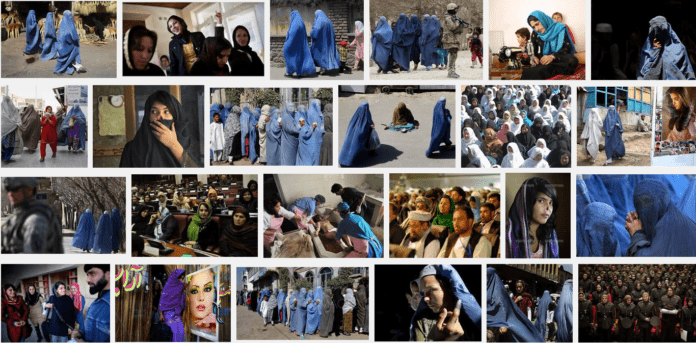Women in Iran and Afghanistan are deprived of civil liberties because they are women. And, when these suppressed women take it to the streets, the governments use force, intimidate, or put them in jail, instead of addressing their demands. Women pay a high price for being women in the two theocracies.
Iran and Afghanistan have recently gained prominence in the international media for committing crimes they consider their moral values. The two countries tread on different paths religiously and ideologically, but they find no disagreement in pursuing one policy – keep their citizens, particularly women, subservient to the state’s diktat. There is no room for deviance – and those who dare to challenge it, have to pay a heavy price, such as how recently the moral brigade of Iran found a young Kurdish woman, Masha Amini, disobeying the dress code defined by the state. She was arrested immediately, and two days later, she died in police custody. Suspicions arose about the custodial torture by the police that resulted in the death of the young woman.
However, police denied the charges and claimed that the cause of death was heart failure.
What happened later was unimaginable for the authorities that were following state policy very religiously. The custodial death of the young woman, arrested on a morality issue, turned the country into a chaos that remains uncontrollable. An outcome that caught the whole Iranian government unaware.
It all started on the day of the funeral ceremony at Saqez, the hometown of Masha Amini in Iran’s Kurdistan province. The mourners turned into protestors against the highhandedness of the police authority. The incident received front-page coverage by all Iranian newspapers, criticizing the imperiousness of the police force for enforcement of the dress code. Iranian President Ebrahim Raisi, a former judiciary chief with an ultra-conservative mindset, ordered an inquiry into the incident.
As the wave of protests continued escalating, more and more people joined the protestors, creating a situation where clashes with the security forces resulted in casualties and mass-level arrests of the participants. It couldn’t suppress the people’s resilience and persistence in raising their voices against the atrocities committed by the government in the name of religious code. The protests went on uninterruptedly spilling over its repercussions to neighboring Iraq as the Iranian forces pounded on the offices and paramilitary bases of Iranian Kurdish opposition groups in Iraqi Kurdistan causing deaths and injuries to many people in the area.
On 5th October 2022, Iranian security forces deployed at universities in several cities, witnesses said, stepping up efforts to quell more than two weeks of protests ignited by the death of 22-year-old Mahsa Amini in the custody of morality police. Iranian schoolgirls have come to the fore in protests over the death of Mahsa Amini, removing their hijabs and staging sporadic rallies in defiance of a lethal crackdown by the security forces. The nationwide unrest sparked by her death has spiraled into the biggest challenge to Iran’s clerical leaders in years, with protesters calling for the downfall of the Islamic Republic founded in 1979.
The Western media picked up this uprising as a revolution in the offing and the people in Western countries took part in processions against Human Rights violations in Iran prompting Iranian authorities to call the envoys of Norway and the UK to lodge their protest against interference in their internal affairs by their countries.
While Iran was busy handling this uprising, a suicide attack took place at Kaaj Higher Educational Centre in Kabul, predominantly inhabited by the Hazara Shia Community, leaving at least 35 students dead, the majority of whom were females. Like Pakistan, the Hazara community in Afghanistan has also been a frequent target of terrorism. Four years ago, another educational center known as Maw’ood education center in the same locality of Dasht-e-Barchi was a target of a similar suicide attack but the victims were teenage students having mixed gender identities. The reason for the attack was then considered to be the English language teaching offered by the institute and the Shia identity of the victims. The objectives of the latest attack were no different from the previous one except that it primarily targeted girls to create fear among them for any pursuit of their desire to get educated.
While the custodial death of Masha Amini in Iran had created people’s reactions in the western world, the brutal attack on 600 students in Afghanistan couldn’t generate a similar reaction from the world community. Among the Muslim countries, Iran was the only one that condemned the incident. However, thousands of Afghan citizens in European and Northern American countries including the US and Canada marched on the streets condemning this deadly attack recently.
In Afghanistan, mostly women from the Hazara community came out in small numbers at various locations to stage protests against the attack and chanted slogans, “Education is our right, genocide is a crime”. In response to this demand, Taliban forces used force and aerial firings against them in Herat.
While one cannot dispute the fact that women in Afghanistan, Iran, and all South Asian countries face gender discrimination and have been deprived of their socio-economic and legal rights. Education is not the only right Afghan women are deprived of – several other civil liberties have been systematically curtailed by the Taliban since they assumed power. From dress code to traveling restrictions and employment discrimination to segregation from mainstream socio-economic activities, Afghan women remained deprived of everyday life experiences solely because of being women. A recent drive in Kabul against beggary found that 5,779 out of 8,444 beggars were women. Nothing could be more revealing of the price Afghan women pay for their gender identity.
For how long the women in these theocracies would be subject to violence and social exclusion? A global consensus for support and advocacy is a dire need of the women who are being methodically victimized by their own states.




